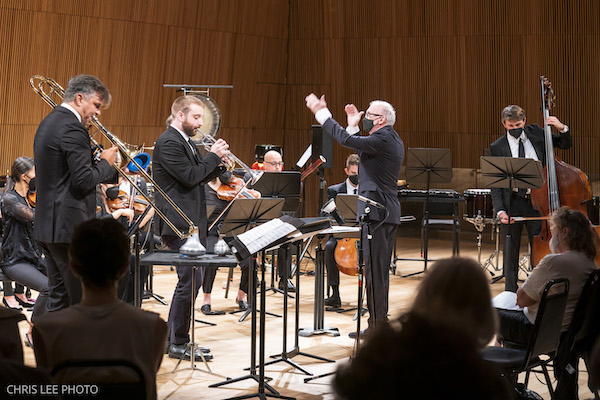Azrieli Prize winners shine in Talea Ensemble’s program of U.S. premieres

Even as a sub-Arctic cold front swept through New York City Saturday night, dropping temperatures 20 degrees, concertgoers at the DiMenna Center on West 37th Street were feeling a fresh musical breeze from up north.
Talea Ensemble’s program of mostly Canadian music for large chamber group impressed not just with the skill of execution by this New York-based ensemble, but with the quality of imagination displayed in scores by our northern neighbors.
In particular, the program showcased the winners of the Azrieli Music Prizes, awarded biennially by the Montreal-based Azrieli Foundation to composers of specifically Jewish or Canadian-themed works. Conductor James Baker led spirited and evocative performances of the three prize pieces, all composed in 2020, as well as two equally impressive older works. All were receiving their U.S. premieres.
The large chamber ensemble for this concert consisted, with minor variations, of a string quartet plus double bass, one each of the standard orchestral woodwinds and brass (except tuba), plus timpani, piano and percussion. When all got going at once, it produced a piercing, brass-heavy sound, not mitigated by certain composers’ fondness for the bass drum.
But the group also proved capable of the most attenuated textures and everything in between, as in David Adamcyk’s Double Concerto of 2011, which opened with muted mumbles and breath sounds, burst out with a dire fortissimo summons, then built its sonic texture in slow, oceanic waves.
Two Talea members, trumpeter Sam Jones and trombonist Mike Lormand, stood in front of the group, although the score seemed to call for them to blend with the others as often as to stand out as soloists. Their expert playing shone especially in an artful cadenza with wah-wah mutes.
The three-song cycle Dissidence by Pierre Mercure is excerpted from his large 1955 work Cantate pour une joie and arranged for soprano and 14 instruments by Jonathan Monro. This performance took the evening to another dramatic and lyrical level, thanks to the accomplished singing of Sharon Azrieli (who is also a board member of the eponymous foundation and daughter of its founder). The mid-century influences of Stravinsky and Milhaud were evident as Mercure laid down a martial beat in “The Young Lions,” caressed a comforting text in “Psalm,” and stepped out brightly in “A Cry of Joy.”
It is no insult to say that Keiko Deveaux’s Arras, composed with the Azrieli Commission for Canadian Music, sounded like a movie score. If one were filming, say, a family drama set in a windswept Canadian fishing village, one would want the subtle emotional currents of this music stirring under the opening credits.
And in fact, the composer said in a program note that the arras (tapestry) of her title weaves the sounds of her family’s historic occupations (farmers and weavers) and nationalities (French-Canadian and Japanese). On Saturday, natural noises of wind and insects combined with mechanical sounds in an undulating texture, while harmonic colors shifted between euphonious superimposed triads and something more dissonant.
An intermission spared the listener the immediate blowing away of Deveaux’s tender family tribute by the explosive opening of Yitzhak Yadid’s Kadosh Kadosh and Cursed, winner of the Azrieli Prize for Jewish Music. By his account, the Jerusalem-born composer aimed to evoke life in his much fought-over hometown, where a sense of blessedness mingles with the curse of inter-religious violence.
Snatches of Arabic and Jewish melody wound through a streetscape of stuttering, tense rhythms. Car horns honked, a klezmer clarinet squealed, and strings danced a hora, as fierce clusters on the piano became a percussion instrument. In the piece’s mysterious second part, ominous deep tremolo and woodwind squeaks failed to disturb a placid Jewish tune in the piano.
In addition to its prize for an existing Jewish work, the foundation also awards a commission for a new one, which in 2020 went to Yotam Haber, resulting in his Estro Poetico-armonico III for mezzo-soprano and chamber orchestra. Born in Holland and raised in Israel, Nigeria, and Milwaukee, this composer might seem to be everything except Canadian. In any case, the foundation invited him to continue his series of works with the Vivaldi-inspired title, processing old Jewish liturgical music through present-day poetry.
On Saturday, singer Eliza Bagg intoned five texts about life and love by modern Israeli poets with a clear, strong, vibratoless delivery that matched the recorded voices of Roman cantors (preserved by the ethnomusicologist Leo Levi), which stole into the background as the piece progressed. The colorful instrumental setting ranged from terse comments by percussion or snap-pizzicato strings to an all-out orchestral roar reinforced by gong and tom-toms.
Saturday’s compelling performances leave one waiting impatiently for the next crop of Azrieli honorees in two years, and hoping this crack ensemble will bring them to New York again.
Talea Ensemble, conducted by James Baker with visual artist Polly Apfelbaum, will perform Oscar Bianchi’s Orango and Wang Lu’s Strange Tales 8 p.m. December 11 at the DiMenna Center for Classical Music. taleaensemble.org.